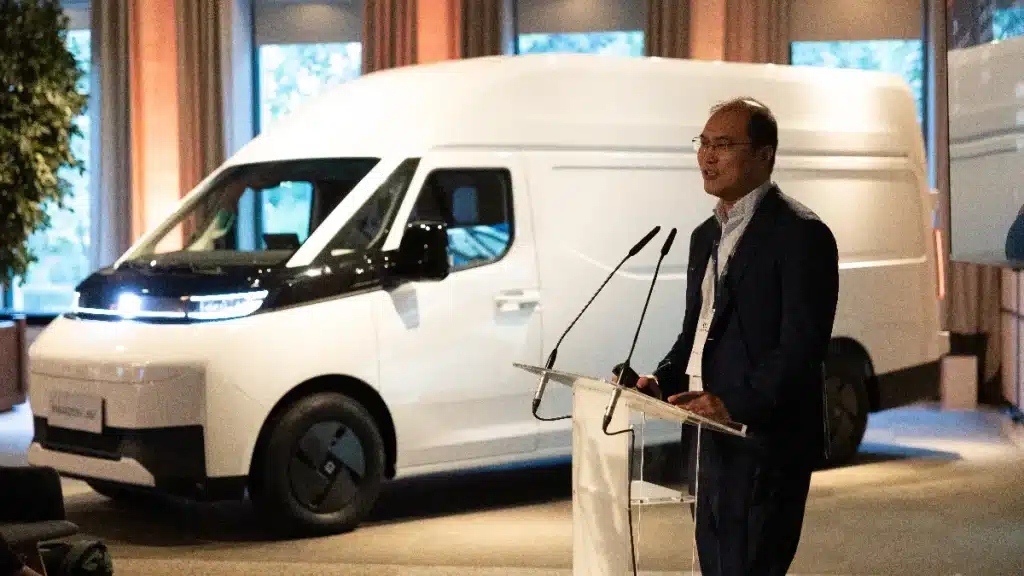
Farizon International may be a new name in the European van market, but despite being a relatively unknown entity, its ambitions are significant.
Apart of Geely Group, owners of Volvo and Polestar amongst others, the Chinese new energy commercial vehicle brand is looking to transfer the success it has had in its domestic market to Europe.
At the centre of this push is CEO Cook Xue who is tasked with leveraging the might of Geely and its global scale to break into new markets. The first step has been the creation of the Farizon SV, the skateboard platform, drive-by-wire, electric van model designed specifically for a European audience. Moreover, Britain is one of its main target markets for the SV.
“UK is our main market in the EU and we started in this very early of this year,” Xue explains.
“So far it’s a good start, and also we have a very amazing launch event with fleet customers and with some dealers.”
Farizon Auto’s UK entry has been orchestrated through a partnership with Jameel Motors, a Saudi-based importer with a global portfolio of brands and countries. “Jameel Motors Group is one of the biggest Toyota distributors globally. [In them] we have selected a very strong reputation partner to co-operate with in the UK market,” Xue explained.

Although Jameel is not itself a household name in Britain, Xue emphasises the strength of its new partner. “They recruited a whole team [with] a very commercial vehicle background, full of experience in the car business.”
Farizon has hit the ground running in the UK market, Xue says that by the end of this month they will have signed five dealers already, and their own, new flagship showroom will open in November in northwest London’s Park Royal.
While other new LCV market brands have recently triumphantly declared multi-location dealer partners, number many tens of locations, Xue seems content with the progress Farizon has made in what is expected to ultimately be one of their largest markets.
“We are not aiming for a big volume. We want to go step by step because we have a priority on the service ability. We cannot care about the sales, if we don’t have service.”
For that reason, Farizon has so far shied away from Europe’s other large markets, perhaps feeling more comfortable in a market where their existing Geely brands have a strong reputation.

“So far in France, Germany and Italy, we don’t start business,” he said. “We have started business in the UK, Spain, Portugal, Belgium and Netherlands. We must stay patient.”
Despite remaining patient with a staged, and measured, roll out, Farizon is not without ambition, and Xue is clear about Farizon’s international targets.
“5%. We see that as a target for five years. I have full of confidence to achieve that.” He frames this as both achievable and modest. “We don’t want over 20% like in China. Overseas business, we want to keep harmony with the local business system. We will compete with others, but we will hold the balance.”
Naturally, 5% penetration in some markets will not be possible and Xue concedes that larger markets will have to make up the shortfall, the UK, likely being one of them due to its growing ELCV penetration rates. Although still lagging behind the required 16% ZEV mandate numbers, the UK new van registrations is currently close to 9%, far higher than some other European markets. “If we calculate the penetration rate [for EVs], the European market, especially the UK, might be much higher than 5%,” Xue admits.

Achieving that market share will only be possible with a broad portfolio, and Farizon are keen to capture a wide range of business with a diverse approach to tailoring products to different segments.
“If I go to the fleet customer, I believe they all have a different demand. If we go to the post, it might be SV, but even go to some supermarket or the delivery business, a chassis is better. So, we select the business model and the different verticals to satisfy our customers.”
That will mean not only evolving SV dimensions with additions to the product line-up, but also new Farizon models to support and attract new business. A new smaller model will launch next year to add depth to the range, while an SV chassis cab will follow in 2027 after along with other versions of the new smaller van. A new car-derived van will then join the range in 2028.
The SV has come in for some criticism on its pricing, when details were announced earlier this year, but Xue is confident that the SV is priced right for the market. With larger batteries than many of its competitors and an enhanced level of trim the SV is at least competitively priced on an item-for-item basis, but Xue believes the unit costs will be competitive allowing dealers to win customers in their local markets.
“We are a new brand, and we are a Chinese OEM, so we are full of confidence on cost control from our vehicles and how to compete with the local market like the UK market. Price wise, we are very confident,” Xue tells What Van.
The might of the Geely empire is certainly a reason for confidence, and while Farizon operates under Geely’s umbrella, Xue says there is a good balance of independence and shared strengths.

“For the brand, we are totally separate. Volvo is another group, and there’s Geely Holding Group, the umbrella… but we can share, in the background, some technology, some solutions,” he explained. “That includes both hardware and software, but we have discussed the next step, how to cooperate with the service channels.”
Xue doesn’t elaborate on what the might mean, and it’s hard to picture Farizon vans being serviced in Volvo passenger car dealers, but sharing certainly a theme for the future of Farizon.
“We can share together… electrical architecture for the future, some powertrain, some technician solutions. Our background is R&D,” Xue says, referring to the strength in depth of the Geely Group. “They gave us a lot of support on some of the solutions, [like] on the safety standards,” he adds. With renowned passenger car safety brand Volvo in their brand stable, it’s little wonder the SV achieved a 5-star Euro NCAP rating.
Although Farizon’s entrance into Europe is still in its first chapter, it has began to sow the seeds of what it hopes to be a long and fruitful existence. A deliberate and patient approach, backed up by an eagerness to listen and adapt its products by leveraging Geely’s technical prowess will hopefully lead to growth.
Whether we will see Farizon achieving or surpassing its five-year goal of 5% will largely depend on their continued engagement and evolution in the market, as well as the market’s own acceptance of what is an entirely electrified line-up.
Published:
Last updated:
